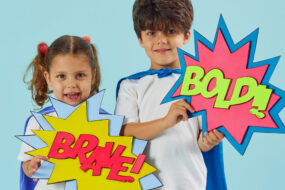How to talk to kids about death
It’s only natural for parents to want to shield their children from one of life’s harshest realities, but coming clean about death (early) is essential.
If you’ve ever told your children your family cat has “gone to sleep” or that grandma has “become an angel”, you’re far from alone.
After all, explaining death to kids when we have a difficult time comprehending it as adults is difficult – and right at the end of the list of conversations we’d like to have.
- Related story: How to talk to your kids about important issues
But that doesn’t mean we shouldn’t try to talk to children about death, says Scott Andrews, an adult and children bereavement counsellor at the National Centre for Childhood Grief.
It’s essential that children learn the truth about death and dying from their parents before they hear it from someone else, he says.
“It’s been our experience that if children get their information from a source that perhaps isn’t as caring or sensitive to their needs, this can have a devastating effect on them,” he says.
“It damages the trust they have in their parents, and it affects how secure they feel in the world.”
His advice? “Truth and inclusion always – no matter how young.”
Here’s how:
Make your language age-appropriate
Children aged five to eight have limited understanding of the finality of death. Those over eight have better comprehension that death is not only the end of life, but that it’s universal.
For this reason, Andrews recommends taking your child’s age and temperament into consideration before you begin the talk.
“There can be much confusion with younger kids and they may ask plenty of questions so it’s best to use simple language they understand,” he says.
“Older kids are more likely to see death as a frightening event so you will need to put aside time to answer questions and provide comfort.”

Use the ‘D’ word
As tempting as it is to soften the blow with expressions such as “passed away” or “gone to sleep”, it’s actually far more helpful to use what Andrews calls “the three Ds” – death, dying and dead.
“Younger kids in particular take things literally, which can only lead to confusion or false hope that mummy is going to eventually wake up,” he explains.
“The D words are concrete, leaving no room for confusion.”
It’s OK to show your emotions
Our children need to know that grieving after a death is OK and the best way to teach them this is by giving them what they need most – a good role model.
“Some parents are reluctant to cry in front of their children or talk about their feelings, but our children learn by watching and mimicking us as they grow,” Andrews explains.
“Show your children that you’re sad and invite questions and conversation about the person that’s passed; it’s an important part of the healing – and learning – process.”
Need help? The National Centre for Childhood Grief provides face-to-face support, as well as email and phone support nationally. Phone: 1300 654 556.
The team at House of Wellness TV asked a group of parents and their children to sit down and talk through some of life’s biggest and most important topics. Watch what they had to say. You can also learn about how to talk to children about body image.
Written by Dilvin Yasa





